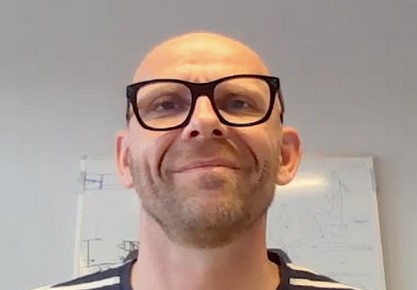The Teacher’s Voice – Video interview – Essentials
Hear the interview here
Serge Rooman The Teachers Voice the EPA Newsletter Interview Podcast today with Serge Roman, prison governor at Merck’s plus prison in Belgium. With a master’s degree in philosophy and a bachelor’s degree in social political science and religious science, he has a rather unusual education for this job….
Link to podcast
Transcription
1. Can you briefly introduce yourself? Where do you work and what’s your function?
I’m working at the prison institution of Merksplas. It’s a prison that contains 420 inmates. Half of them is mentally disabled and the other half of the incarcerated persons have sentences up to seven years.
2. Can you give us some general information about your prison? Is it a big prison?
As for Belgium, it is quite a big prison. We have a lot of prisons with 200 inmates, some of them with hundred. So, we are in the group of the bigger ones. Another thing which is very special, is the fact that we combine the mentally disabled with the “normal” convicts. We try to separate them very strictly because we want to have a therapeutic view and treatment of the mentally disabled that is completely different of the other attitude towards normal prisoners.
3. So, all of the mentally disabled are getting therapy?
That’s the idea. But we have to say we are not staffed adequately so we can provide some kind of pre therapy. We call it pre therapy. We prepare the people to go to a psychiatric institution afterwards. That’s the idea.
4. In this environment or with this kind of people you have in your prison, what do you think education can contribute to the reinsertion of these people and then in general?
Oh, it can do a lot with people here. For the common prisoners it’s a way to prepare for the period after the incarceration. So, everything that has to do with education is valuable because most of them never followed something at school or did not go to school. Some of them are for the first time really consciously in the classroom. That’s really a new experience being consciously in a classroom. For me that it’s very, very important that prisoners can go to classes, to courses. That’s one thing to prepare for the reinsertion. But there is another thing which is very important, that is the atmosphere that it creates in your prison. When we have education, we have almost some kinds of a non-carceral atmosphere. In the classroom, you can feel that it is normal. You’re in prison and at the same time a lot of inmates tell me that you are not, and that this is really humanising the system, very invisibly. That’s also very important for the mentally disabled. But a lot of the courses are too difficult, so there we need other kinds of education. A lot of them are not going for a job afterwards but are going to an institution. So, we need some other kinds of education for them.
5. You said many of them were the first time in the classroom. From Switzerland I know that this is much more the case for foreign incarcerated persons. Is this the same case in Belgium, or are these Belgium citizens?
No, Belgium citizens! Ok, we have schools and there is an obligation to go to school, but when you see to the results, they quit at the age of 13 or 14. They don’t go to school. They hang around at the streets. Sometimes they are placed in an in a closed institution for juveniles, sometimes they are not, and then they don’t have a school diploma at the end. Sometimes people don’t like to hear this, but we have a lot of citizens with a north Belgium background, and they live in certain areas in the cities. And in these areas, we see that education is very, very difficult because they don’t have a culture to go home after school and to do their homework. They hang around on the streets, they play, they often develop other skills, but not the formal skills, the educational skills. In the end, they get behind all the time.
6. In these cases, prison has the like the obligation of educate these people, to form them as adults.
It’s even more than that. You cannot organize for these people just normal courses as if you would do for 100% traditional Belgian background. You have to learn them to go to school. You have to go to their rooms and say come on, it’s time to go to school, it’s time to pack your things and afterwards you have to say ‘and now we are going to do another half an hour of homework’. You have to stay close with them. This is really important. You have to take them by the hand.
7. That’s my experience too. I think it’s already a great success if you bring them to the classroom.
Oh yes, sure. In Belgium, we are not good in organizing what we call ‘pampering’. When you’re staying close with them, people from outside think you are too soft with them. They should work a period and they should study a period. You give them an opportunity and they should follow it. But it doesn’t work like that. They stay in bed if you don’t do anything they wouldn’t come.
8. You said before education contributes to a good atmosphere in in the in your institution. Do you think education is also an important factor to improve security?
Yes, of course. When you have a higher degree of humanity in your prison, there is a much higher degree also of security, of course. But when I say ‘of course’ not everybody believes me, But, when people really are developing skills, they are busy with doing that and not doing other things that are threatening our security, It is because they are on their own, doing nothing, so that all these ideas come to do other things which are not good.
9. You said for those people who are not really acquainted with formal education, do you have other things to do? Like an art workshop, or a theatre course, playing music together, or offering yoga classes?
For example, you can follow a course for working in the garden. You can do it on a professional level, but you also can do it so that you learn how to keep your garden well at home. So, you have to downscale a little bit the end terms, but then everyone can follow. And in the end, they have some kind of certificate and they can do something at their home. And that’s a certificate from the Ministry of Education.
They can get always some kind of certificate. But we need more variation in that kind of downscaled courses, especially for the mentally disabled. Because otherwise they are isolated in their psychiatric institution and they follow therapy and that’s it. That’s not enough! They really should have the feeling I am following school in one way or another and also, I can get some kind of certificate. And for instance, afterwards they can do some work at for the townhall, for the village, in the greening, some easy tasks, something like that.
10. Would you like to offer more educational activities if you could?
Yes, absolutely! Because it’s really the key to reinsertion, first of all, but it’s also the key to humanise your prison. The more education you have, the more the detainees are busy with something positive, with personal development, with doing something, and that is humanising your prison. They are not busy with negative things. On the contrary. The third thing is the fact that the day is filled up with things that make sense.
11. Is it correct then, that there is no obligation to work in a Belgium prison?
Yes, there is no obligation to work. We have a very bad history with forced labour. It is seen as a way of earning an economic output very cheaply.
12. You work in the Ministry of Justice and education belongs to another ministry. How is the cooperation and working between the two ministries?
It’s always more difficult because you have to negotiate everything at the at the other side. But we need the experts, the educators of course, to make educational policy. We cannot do that in the Ministry of Justice. Therefore, we need the experts.
But when there is the federal government managing security issues, and then you have the Flemish government which has to organise education, those two levels are not always on very good terms. Therefore, in your local prison, that can become a problem. We would like to have more education, but when the other level says we don’t have a budget or that’s not our priority, everything is blocked at our place. For me personally, as a prison governor, it is really essential I that people can follow courses. More than that they work. Of course, they have to work sometimes to earn money for the period after their release. But to be honest, I think they have more advantage with some certificates which will give them at the end some kind of ticket for a normal life. The money will go away after a few months. Having been released the money doesn’t last that long, the certificate does.
13. Coming to the last question. Nowadays everyone is talking about digital skills and it seems or it is important that people know about or have digital skills to become full 21st century citizens. How can you achieve this in prison and in your prison in particular? Do the incarcerated persons have access to the Internet?
No. First of all, they don’t have any kind of access. It’s forbidden in a very drastic way. There is no Internet for them, that’s that is one thing. Another thing is that they were not digitalised before they came in. The periods that they are here, they don’t learn anything about DG skills. One could say that here in Belgium prisons we are absolutely not in the 21st century. This is the digital Middle Ages! Only two or three prisons are connected to the so-called prison cloud. And we don’t have an internal network, neither. Everything is with hard copy! This has some advantages too but we have to teach digital skills as well.
14. Could you imagine that, let’s say within 10 years, the incarcerated persons will have a broad Internet access even from their cells?
I can imagine it, but the policy makers don’t see the urgency. We have prisoners that leave the prison who have never saw a smartphone in their lives. As for me personally, this is unacceptable. We don’t prepare people when they cannot even manage to make a phone call with a smartphone and they are not able to exercise it because it’s forbidden in prison. And the public administration is more and more online. For example, you have to register yourself online. This is big problem for our social workers who have to do all kind of registrations for them. And again, the prisoners are there, passive. Everything is done for them. It shouldn’t be like this.
15 What would you be, your perfect prison from your point of view?
My perfect prison would be quite small, 50 or 60 prisoners maximum, focused 100% on reinsertion, getting skilled with teachers who have access just in the classroom but also in the other spaces of the prison. Like coaches, they go also to the cells of the students. They work more with them, mixing between a classroom and the daily life situation. They live in one way or another with them. They become a partner in this setting, something like that, so that everybody is involved with getting these people back on the rails and they should feel it that everybody is willing to get them back on the rails. I mean, that would be my perfect prison.
Dear Serge, thank you for this interview!
Slightly adapted transcription from the original interview done by the editors.


![Forword – Newsletter September 2022 [EN | GE]](https://www.epea.org/wp-content/uploads/cropped-sitecon-340x226.png)
![UNESCO Webinar – Digital Initiatives in Prison [EN/FR/ES]](https://www.epea.org/wp-content/uploads/unescologo.jpg)

